This is from the November 10, 2004 program.
Note that there is a zip file of all 4 clips also available for download.
Daily Show Clips From November 10, 2004
Included in these clips:
Ashcroft’s resignation and hand written resignation letter
Ed Helms on Florida’s disenfranchisement ploy of a checkbox in which
voters had to affirm that “I have not be adjudicated mentally incapacitated
with respect to voting, or, if I have, my competency has been restored.
Science Scope – finding the 18,000 year-old remains of a man-like “hobbit”
Global Warming creating a lovely “Northern Sea Route” in Russia
(Makes global warming worth it all!)
Tom Wolfe interview about his new book: “I am Charlotte Simmons.”
Category Archives: Bye-Bye Ashcroft
Ashcroft Expected To Resign (a.k.a. Ding Dong The Witch Is Dead)
Not that I wish him dead…or even physically ill. (Even though he’s been trying to kill the Constitution for a while now.)
But if he resigns, theoretically, he can’t do us any more harm.
It will be only the second Shrub official to hit the road in my “Bye-Bye” series.
This is the best news I’ve heard all week!
Ashcroft Likely to Leave Post
By Curt Anderson for The Associated Press.
Attorney General John Ashcroft is likely to leave his post before the start of President Bush’s second term, senior aides said Thursday.
Ashcroft, 62, is described as exhausted from leading the Justice Department in fighting the domestic war on terrorism since the Sept. 11, 2001, attacks. Stress was a factor in Ashcroft’s health problems earlier this year that resulted in removal of his gall bladder.
Ashcroft is expected to resign before Bush’s Jan. 20 inauguration, said aides who spoke only on condition of anonymity. They said there is a small chance he would stay on, at least for a short time, if Bush asked him.
The attorney general has not officially informed his staff of his future plans, spokesman Mark Corallo said.
At a news conference, Bush said he hasn’t made any decisions about his Cabinet.
Ashcroft, a former two-term governor and senator from Missouri, has long been a favorite among Bush’s base of religious conservatives. He also is a lightning rod for Democrats and other critics on issues ranging from the anti-terrorism Patriot Act, which expanded rules for eavesdropping, to abortion rights and gun control.
Names that have been floated in recent weeks as a possible replacement include Ashcroft’s former deputy, Larry Thompson, who would become the first black attorney general. Others include Marc Racicot, who was Bush’s campaign manager, and White House general counsel Alberto Gonzalez, who would give Bush a notable Hispanic appointment.
Constitutionality of Secret 911 Cases Headed For The Supreme Court
Secret 9/11 Case Before High Court
By Warren Richey for The Christian Science Monitor.
It’s the case that doesn’t exist. Even though two different federal courts have conducted hearings and issued rulings, there has been no public record of any action. No documents are available. No files. No lawyer is allowed to speak about it. Period.
Yet this seemingly phantom case does exist – and is now headed to the US Supreme Court in what could produce a significant test of a question as old as the Star Chamber, abolished in 17th-century England: How far should a policy of total secrecy extend into a system of justice?
Secrecy has been a key Bush administration weapon in the war on terrorism. Attorney General John Ashcroft warns that mere tidbits of information that seem innocuous about the massive Sept. 11 investigation could help Al Qaeda carry out new attacks.
Yet this highly unusual petition to the high court arising from a Miami case brings into sharp focus the tension between America’s long tradition of open courts and the need for security in times of national peril. At issue is whether certain cases may be conducted entirely behind closed doors under a secret arrangement among prosecutors, judges, and docket clerks.
While secret trial tactics have reportedly been used by federal prosecutors to shield cooperating drug dealers, it’s unclear whether the high court has ever directly confronted the issue. But that may change if they take up MKB v. Warden (No. 03-6747).
This is among the first of the post-Sept. 11 terrorism cases to wend its way to the nation’s highest tribunal. There was no public record of its existence, however, until the appeal was filed with the clerk of the US Supreme Court.
A federal judge and a three-judge federal appeals-court panel have conducted hearings and issued rulings. Yet lawyers and court personnel have been ordered to remain silent.
“The entire dockets for this case and appeal, every entry on them, are maintained privately, under seal, unavailable to the public,” says a partially censored 27-page petition asking the high court to hear the case. “In the court of appeals, not just the filed documents and docket sheet are sealed from public view, but also hidden is the essential fact that a legal proceeding exists.”…
The case is significant because it could force a close examination of secret tactics that are apparently becoming increasingly common under Attorney General Ashcroft. In September 2001, he ordered that all deportation hearings with links to the Sept. 11 investigation be conducted secretly. In addition, the Justice Department has acknowledged that at least nine criminal cases related to the Sept. 11 investigation were being cloaked in total secrecy.
MKB v. Warden is the first indication that the Justice Department is extending its total secrecy policy to proceedings in federal courts dealing with habeas corpus – that is, an individual’s right to force the government to justify his or her detention.
The case offers the Supreme Court an opportunity for the first time to spell out whether such secret judicial proceedings violate constitutional protections. It may also offer the first insight into how much deference a majority of justices is willing to grant the government in areas where the war on terrorism may tread upon fundamental American freedoms…
Federal judges have the authority to order sensitive documents or even entire hearings sealed from public view when disclosure might harm national security. Such rulings are usually issued after the judge has explained the need for secrecy in a decision available to the public.
In addition, judges can order that an individual be identified in public court filings only by a pseudonym or by initials, as happened when the MKB case arrived at the US Supreme Court.
What is highly unusual in MKB v. Warden is that lower court judges ordered the entire case sealed from the start – preventing any mention of it to the public.
In her petition to the court, Miami federal public defender Kathleen Williams says the judges’ actions authorizing the secrecy without any public notice, public hearings, or public findings amount to “an abuse of discretion” that requires corrective action by the justices.
“This habeas corpus case has been heard, appealed, and decided in complete secrecy,” Ms. Williams says in her petition.
A government response to the petition is due Nov. 5. It will mark the first time the Justice Department has publicly acknowledged the existence of the habeas corpus action. The justices are set to consider the case during their Nov. 7 conference.
Justice Department officials have defended the blanket secrecy policy, saying that public hearings and public dockets would undermine efforts to recruit detainees as undercover operatives to infiltrate Al Qaeda cells in the US. According to press reports, similar secret trial tactics have been used by federal prosecutors to shield cooperating drug dealers from mention in public court documents that might blow their cover and end their use as operatives in ongoing undercover narcotics sting operations.
FBI Special Agent Coleen Rowley Explains How The Shrub Administration’s Intimidation Tactics Erode Our First Amendment Liberties
Right On Coleen! Thanks for having the guts to publish this article. It means a lot coming from you.
There are a lot of good people working for the government right now that are working for change, but it’s really hard because their hands are tied. Most of them are in Damage Control mode and just trying to make it through their day-to-day activities without having to participate in anything too horrible until this administration can be replaced.
Coleen Rowley: The wrong side of ‘us vs. them’
By Coleen Rowley for the Star Tribune.
I didn’t attend Attorney General John Ashcroft’s speech last month in Minneapolis, but newspapers have quoted him as saying that Americans are “freer today than at any time in the history of human freedom.”
Well, this American disagrees! And I would venture to say that many others feel the same way — those who have been put on the “them” side of the “us vs. them” equation in the context of the administration’s “you’re either with us or against us” mentality.
It didn’t matter whether you were a career FBI agent, a decorated war veteran, a duly elected congressman or senator, a military general or even a former president, you were labeled a traitor for voicing any criticism of administration policies. You were accused of giving aid and comfort to the enemy, called a friend of Osama bin Laden and thrown to the wolves (or more accurately, the FOXes).
The intimidation in this country that’s been whipped up by this official fear and warmongering has been far more effective than any Patriot Act in whittling away our civil liberties…
It’s also no secret that this administration has used its considerable power to fight giving any real legal protection to government whistle-blowers and even attempted to water down the Sarbanes-Oxley Act’s protections recently enacted for corporate whistle-blowers.
Of course, no “whistle-blower protection” exists for public disclosures or articles such as this one. But even without it, the First Amendment should suffice and is what I rely on. However, the official warnings along these lines that I’ve repeatedly received in the course of my attempts to speak on issues of public importance seem little more than veiled threats; or are they perhaps a warning that the First Amendment is not as robust as it used to be?
There’s another large segment of our citizenry who have found themselves cast as “thems” by this “war” mentality. Complaints of discrimination against Muslim workers and reports of hate crimes against people believed to be of Middle Eastern descent have at least doubled…
Although it must be recognized that the origin of this problem was in the horror of the violent attacks themselves and that certain government leaders, such as FBI Director Robert Mueller, have undertaken efforts to reach out to affected Arab groups, the social scientists point to other government actions following 9/11 (including the government’s roundup and detention of illegal immigrants, the special registration requirements that single out students and visitors from Muslim nations, and the wars in Afghanistan and Iraq) as sending “social signals” that are worsening these biases.
A specialist in the issues of prejudice and stereotyping has noted that people who perceive themselves under threat naturally tend to think of “who’s with me” and “who’s against me.” In any event, I doubt that many in the Arab-American segment of the populace feel “freer today,” as Ashcroft’s generality suggests.
Walter Cronkite On Ashcroft’s New Inquisition
Cronkite: The new Inquisition
By Walter Cronkite for the Denver Post.
In his 2 1/2 years in office, Attorney General John Ashcroft has earned himself a remarkable distinction as the Torquemada of American law. Tomas de Torquemada was the 15th century Dominican friar who became the grand inquisitor of the Spanish Inquisition. He was largely responsible for its methods, including torture and the burning of heretics – Muslims in particular.
Now, of course, I am not accusing the attorney general of pulling out anyone’s fingernails or burning people at the stake (at least I don’t know of any such cases). But one does get the sense these days that the old Spaniard’s spirit is comfortably at home in Ashcroft’s Department of Justice.
The Patriot Act is much in the news, as Ashcroft and his minions seek both to justify its excesses and strengthen them, thus intensifying its dangerous infringements on the Bill of Rights.
There was something almost medieval in the treatment of Muslim suspects in the aftermath of Sept. 11. Many were held incommunicado, without effective counsel and without ever being charged, not for days or weeks, but for months or longer, some under harsh conditions designed for the most dangerous criminals.
It was in the spirit of the Inquisition that the Justice Department announced recently that it would begin gathering data on judges who give sentences lighter than called for by legislative guidelines.
Nothing so clearly evokes Torquemada’s spirit as Ashcroft’s penchant for overruling U.S. attorneys who have sought lesser penalties in capital cases. The attorney general has done this at least 30 times since he took office, according to the Federal Death Penalty Resource Counsel. In several cases, Ashcroft actually has overturned plea bargains negotiated by those government prosecutors.
The New York Times editorialized that the attorney general seems to want the death penalty used more often.
Ashcroft is not alone in this. His boss, while governor of Texas, seemed never to have met a death sentence he didn’t like. The two of them represent a subdivision of the Republican Party known as the “social conservatives,” who often have favored the use of government power to police moral issues they view as modern heresies, such as abortion, homosexuality and obscenity. They contrast with those Republicans who tend to resist such uses of federal power and can generally be counted on to defend individual rights.
What makes this administration’s legal bloodthirstiness particularly alarming is the almost religious zeal that seems to drive it. So, what we are seeing now is a confluence of two streams of American thought. One of those streams represents those who believe security must have priority over civil rights. The other stream represents those who believe that civil rights must be preserved even as we prosecute to the hilt the war on terrorism.
Our liberty could drown in the resultant turbulence of these colliding currents.
Ashcroft Attempts To Defend Patriot Act And Divert Attention Away From His Own Legal Problems
Ashcroft slams critics as Patriot Act backlash grows
By Tom Regan for the Christian Science Monitor.
The attorney general continues to insist that the Act “respects rights and increases security.” USA Today looks at how the Act is at the heart of Ashcroft’s powers as attorney general.
There are also some people who don’t think Ashcroft and the Patriot Act have gone far enough. They would like to see a halt to all immigration of any kind, for instance, as a better way to prevent terrorism.
Delaware Online reports that Patriot Act “abuses,” however, are starting to surface. People with no connection to any form of criminal activity say that they are being deprived of the right to open bank accounts, get credit cards, etc. because of the Patriot Act.
Shortly after he graduated from college in May, French Clements of San Jose, Calif., tried to open an online brokerage account with Harrisdirect, where his stepfather has an account. A day after he completed the online application, however, he got a brief e-mail from Harrisdirect saying, “We regret to inform you that we are unable to approve your application at this time: The customer’s identity not properly authenticated per the USA Patriot Act.” Clements was stunned, and so was his mother, Alayne Yellum. “Maybe they don’t like people named French,” she says…
Critics of the Patriot Act also point out that it is now being used in other areas of law enforcement.
“Within six months of passing the Patriot Act, the Justice Department was conducting seminars on how to stretch the new wiretapping provisions to extend them beyond terror cases,” said Dan Dodson, a spokesman for the National Association of Criminal Defense Attorneys. “They say they want the Patriot Act to fight terrorism, then, within six months, they are teaching their people how to use it on ordinary citizens.”…
An analysis of the act, as it is being implemented by the federal government and subtly revised by the courts, indicates that so far it has not threatened the civil liberties of millions as some claim but neither has its use avoided unintended consequences and damage to innocent lives. The problem is that because of government secrecy
Ted Koppel On The Dangers Of The Patriot Act
This program was broadcast on September 4, 2003 at 11:30 pm.
Ted Koppel put together an amazing Nightline where he interviewed folks from the ACLU and the Justice Department, among others — and was able to paint a frighteningly accurate picture of the Patriot Act and its new bastard brother, the Victory Act.
If you’ve only got a minute, at least watch his closing thoughts on the matter. (Small – 3 MB) (Links to the complete program are located below.)
The men who drafted our constitution, who framed our civil rights and protected our various freedoms under the law would, I suspect, retch at some of the bone headed, self-serving, misinterpretations of their intentions that they so often use these days to undermine the very freedoms they pretend to safeguard. The miracle of American Law is not that it protects popular speech, or the privacy of the powerful, or the homes of the priviledged, but rather, that the least among us, those with the fewest defenses thoses suspected of the worst crimes — the most despised in our midst, are presumed innocent until proven guilty.
That remains as revolutionary a concept now as it was in the 1780s. It makes protecting the country against terrorism excruciatingly difficult, but we cannot arbitrarily suspend the rights of one catagory of suspects without endangering all the others.
Also of particular interest was the interview with Barbara Comstock, Director of Public Affairs for the Justice Department. Ted Koppel wanted to know why everything had to be kept secret. Why your medical records could be obtained without your being notified, etc. She kept bringing up the “al qaeda safe house,” which Ted finally told her “your floggin that Al Queda safe house to death Ms. Comstock.”
Ted also had to keep correcting Comstock by inserting the word “suspected” when she was talking about who the Patriot Act was being routinely used against. (“Suspected” terrorists and “suspected” enemy combatants.) She just couldn’t stop forgetting that these people were only suspects. That whole innocent until proven guilty thing kept slipping her mind.
Here’s a partial transcript from the end of the interview. I’ve created a small clip of this. (Complete versions located below.):
“What I’m asking is, since we are in agreement is that what we are talking about is that these people are people who are “suspects.” None of these people is a confirmed terrorist here. If you have a confirmed terrorist, I guarantee you, everyone who is watching tonight is going to applaud you and say “way to go.” But we are still dealing with people here who are suspected of something…” Koppel said.
“Sure.” she said.
“..and who therefore presumably have the same rights as any other American citizen, if they are citizens.” Koppel said.
Then later…
“How do we define who falls under the provisions of this act as distinct from the normal protections that exist for American citizens? Is it just that you define it? You define someone as being a suspect associated with terrorism? And if you can make a case to a court than you can lift some of the restrictions that would otherwise apply?” Koppel asked.
“Well the restrictions that would otherwise apply are still there. What it is is that we are operating under the same type of legal structures that we have always operated under, but now we’re able to…” Comstock said.
“Well not quite. I mean there are some people, obviously, who have been put in jail and who aren’t even permitted to have attorneys or who are not permitted to talk with their families. Now we are talking about people who. (stops) Right?” Koppel said.
“That’s has nothing to do with the Patriot Act. That’s actually “enemy combatants” that are outside the Justice Department per view. And that is the President’s authority at war powers.” Comstock said.
“Suspected, enemy combatants.” Koppel said.
“But those are…actually they’ve been designated as enemy combatants.” Comstock said.
“Well, designated without a trial.” Koppel said.
“Yes.” She replied.
Here’s the whole show in “complete” and “parts 1 and 2” versions:
Nightline – The Patriot Act – Part 1 of 2 (Small – 26 MB)
Nightline – The Patriot Act – Part 1 of 2 (Small – 26 MB)
Nightline – The Patriot Act – Complete (Small – 52 MB)
I’ve also provided a clip of the cool ACLU commercial that was aired during the broadcast. (Small – 2 MB)

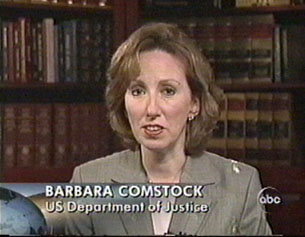
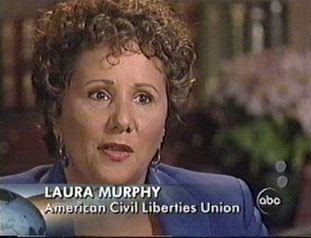
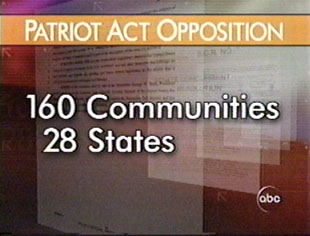
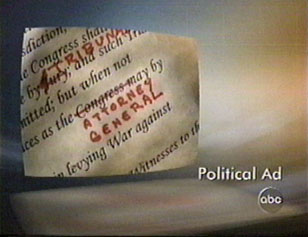
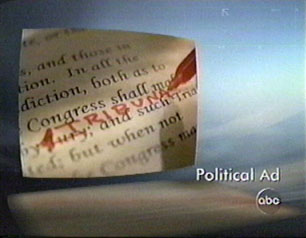
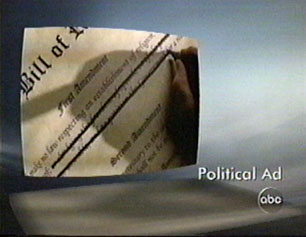
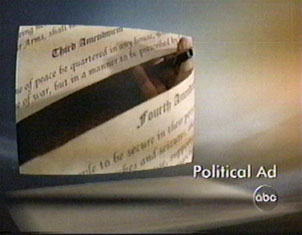
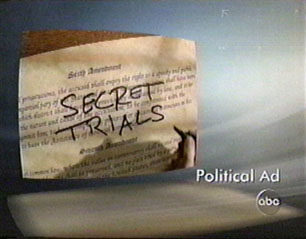
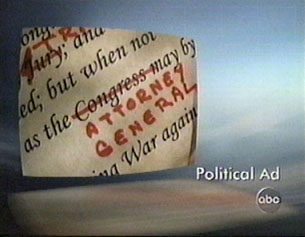
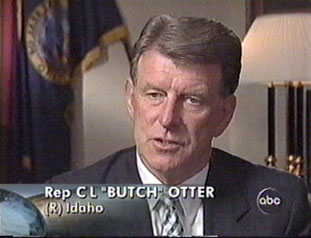
Mark Fiore On Ashcroft’s Summer Victory Tour
This totally rocks dude:
Victory Act Summer Tour
NY Times Editorial: Victory Act Is Unpatriotic
An Unpatriotic Act
A NY Times Editorial
Attorney General John Ashcroft has embarked on a charm offensive on behalf of the USA Patriot Act. He is traveling the country to rally support for the law, which many people, both liberals and conservatives, consider a dangerous assault on civil liberties. Mr. Ashcroft’s efforts to promote the law are misguided. He should abandon the roadshow and spend more time in Washington working with those who want to reform the law.
When the Patriot Act raced through Congress after Sept. 11, critics warned that it was an unprecedented expansion of the government’s right to spy on ordinary Americans. The more people have learned about the law, the greater the calls have been for overhauling it. One section that has produced particular outrage is the authorization of “sneak and peek” searches, in which the government secretly searches people’s homes and delays telling them about the search. The House last month voted 309 to 118 for a Republican-sponsored measure to block the use of federal funds for such searches…
One member of Congress, Representative John Conyers Jr., a Michigan Democrat, has charged that Mr. Ashcroft’s lobbying campaign, in which United States attorneys have been asked to participate, may violate the law prohibiting members of the executive branch from engaging in grass-roots lobbying for or against Congressional legislation. Legal or not, the campaign seeks to shore up a deeply flawed piece of legislation. The Patriot Act is the Bush administration’s attempt to make the country safe on the cheap. Rather than do the hard work of coming up with effective port security and air cargo checks, and other programs targeted at actual threats, the administration has taken aim at civil liberties.
The administration is clearly worried, as opposition to the excesses of the Patriot Act grows across the country and the political spectrum. Instead of spin-doctoring the problem, Mr. Ashcroft should work with the law’s critics to develop a law that respects Americans’ fundamental rights.
Daily Show On Ashcroft’s “Victory Act” Tour
This is from the August 21, 2003 program.
Ashcroft’s Victory Act Tour (Small – 4 MB)
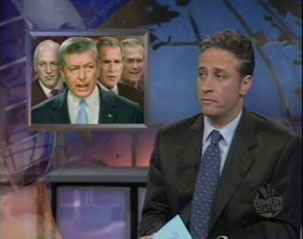
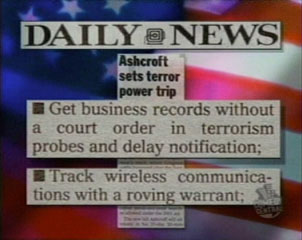
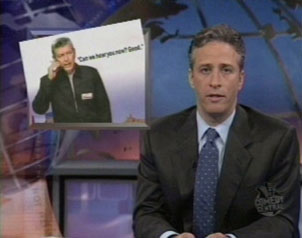
The Daily Show (The best news on television.)